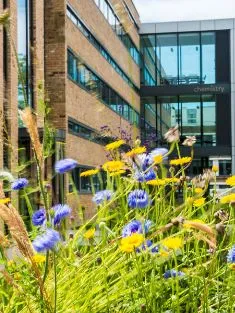Winner: 2020 Higher Education Technical Excellence Award
Technical Support Team in the Department of Chemistry at Lancaster University
Lancaster University
For the team's pivotal role in operating the laboratory courses, supporting research and developing a highly successful and creative outreach programme in a new Department of Chemistry.

The Technical Support Team at Lancaster University support vital aspects of the chemistry department’s day-to-day running in addition to providing research support and delivering creative outreach programs.
The team comprises ten dedicated and enthusiastic team members – Experimental Officers, Teaching Technicians, Outreach Officers and the Departmental Superintendent. Their work underpins not only the day-to-day running of the chemistry department by delivering technical teaching support, but also provides highly specialised research support across various aspects of analytical chemistry and has been responsible for the implementation of a highly successful creative outreach program.
The team includes:
- Dr Geoff Akien – Experimental Officer in Nuclear Magnetic Spectroscopy
- Ms Naseem Aktar –Teaching Laboratory Technician
- Dr Sara Baldock – Experimental Officer in Microscopy & Nanofabrication
- Ms Rachel Bashforth – Associate Lecturer and Outreach Officer.
- Dr John Baum -- Teaching Laboratory Technician
- Dr Nathan Halcovitch – Experimental Officer in X-ray Techniques
- Mrs Helen Quirk – Departmental Superintendent
- Dr David Rochester –Experimental Officer in Separations & Mass Spectrometry
- Mrs Gail Sheldrick – Recruitment, Conversion and Marketing Coordinator
- Dr David Townsend –Innovation Fellow Physical and Analytical Chemistry
We’re motivated to help answer research questions that are of relevance to today's society.
Lancaster University Technical Support Team
Q&A with Lancaster University Technical Support Team
What motivates you?
Inspiring the next generation of scientists through our outreach program and helping to answer research questions that are of relevance to today's society.
Why do you think interdisciplinary research and collaboration is important in science?
Because it allows for the mixing of ideas that can stimulate new approaches to challenging problems.